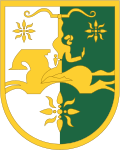History
On 22 September 1996, Turkey announced that residents of Abkhazia would no longer be allowed to travel to Turkey on Soviet-era identification documents, and would instead have to obtain Georgian passports. [2]
In July 2009, Abkhazian Foreign Minister Sergei Shamba said that the Abkhazian government has certain contacts with the government of Turkey; negotiations on resumption of air and sea communication are being held. [3]
Officially, the Turkish government did not want to antagonize its neighbor and important trading partner Georgia. It is also why Turkey allegedly maintained a strict trade embargo on Abkhazia. [1] In 2009, several Turkish ships heading to Abkhazia have been seized by Georgian naval forces in international waters due to the Georgian sea blockade of Abkhazia. [1]
There is a large Abkhaz diaspora consisting of the descendants of the Abkhaz who fled or were expelled from Abkhazia in the 19th century. [4]
In 1994, Abkhazia established the post of a plenipotentiary representative of the Republic of Abkhazia in the Turkish Republic. [5]
In September 2009, the Foreign Ministry Deputy Undersecretary Ünal Çeviköz went to the Abkhaz capital of Sukhumi, where he met with Abkhaz officials. This was the first visit to Abkhazia of a foreign national diplomat since the August 2008 war. [6]
The importance of the Turkish factor in Abkhaz policy was demonstrated by the first visit by President Bagapsh to Ankara in April 2011. [7]
Turkey's ambassador to Georgia, Murat Buhran, stated in 2014 that Turkey and Abkhazia had established a special group to deepen “bilateral” ties. [8]
In 2021, Abkhazia appointed a new Plenipotentiary Representative of Abkhazia in Turkey. Ibrakhim Avidzba previously worked for the State Security Service of Abkhazia. [9]
Trade
Today, Turkey is Abkhazia's second-most important trade partner with about 18 percent of Abkhazia's trade turnover. [8]
In 2016, Abkhazia joined sanctions imposed by Russia on Turkey. [10] [11]
In 2020, the Turkish banks Ziraat Bank and İşbank began servicing the Abkhaz credit card system APRA. [12] [13] The Georgian foreign ministry responded by stating that the Abkhaz APRA cards are regular Russian Mir cards. [14]
This page is based on this
Wikipedia article Text is available under the
CC BY-SA 4.0 license; additional terms may apply.
Images, videos and audio are available under their respective licenses.

